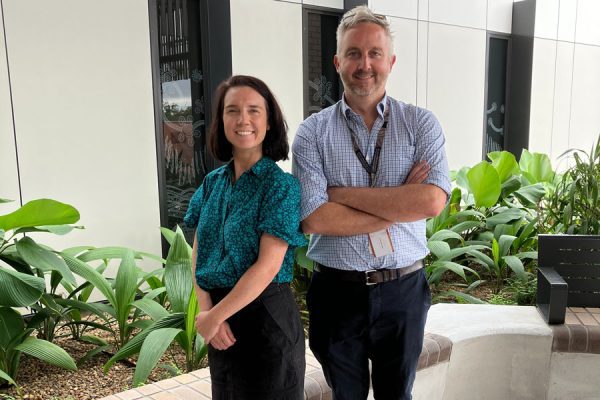How pharmacists contribute to the urgent care patient’s journey

Pharmacy Team Leader Nicola Farrell and Pharmacy Director Tim Dunn
A multidisciplinary team approach to patient care, is a significant factor contributing to improved outcomes for Minor Injury and Illness Clinic patients.
Sarah Haynes, is a Clinical Nurse and joins the new Bribie Island Satellite Hospital Minor Injury and Illness Clinic when it opens in July 2024. According to Sarah, a multidisciplinary team, or MDT, is comprised of many health professionals from several clinical disciplines who care, collaborate and communicate together to address as many aspects of the patient’s care as possible.
“When a patient presents to the Minor Injury and Illness Clinic, our MDTs work closely as a team, allowing us to effectively gather the patient information and history, and then develop the best treatment plan for the patient’s presentation,” Sarah said.
“Our MDTs create a positive impact on the patient’s journey and can really influence the outcomes of our patients who are often short-stay admissions. Having the input of the MDT means that patients get early initiation of diagnostic procedures (if required), timely discharges or connection to other relevant departments as required.”
Nicola Farrell is the newly appointed Pharmacist Team Leader for Caboolture and Kilcoy Hospitals and Woodford Health (CKW) and has oversight of the Bribie Island Satellite Hospital. She says the role of clinical pharmacists in the MDT is integral to the care and safety of patients, especially in speciality or urgent care settings like the Minor Injury and Illness Clinic.
“Pharmacists are onsite at the Caboolture, Kallangur and Bribie Island Satellite Hospitals and our role supports safe medicine management which includes working with the doctors and nurse practitioners to ensure the safe prescribing, supply and administration of medicines,” Nicola said.
Minor Injury and Illness Clinic patients frequently present with minor injuries like cuts, bruises, sprains, and strains, as well as respiratory infections such as coughs, colds, and congestion. Additionally, common presentations include rashes, minor burns, insect bites, and other skin irritations, along with urinary tract infections.
According to Nicola, while these issues are typically classified low-risk, patients still benefit from education on newly prescribed medications and ongoing consultation and education regarding their regular medicines.
“As an example, if a patient presents with a complex medical history, our role is to take a full medicines history, making sure that patient is taking the correct dosage and that there are no incompatibilities between the medicines prescribed onsite and what they are taking as regular medicines at home,” Nicola said.
“We are very focussed on supporting patients as they journey through our facility. As patients transfer from our care to their homes and GP services, we review their discharge prescriptions to ensure they are on optimal therapy.
“Patients with chronic illnesses such as asthma, chronic obstructive pulmonary disease, and congestive heart failure really benefit from this review because they are often on complex drug regimes. Our review helps to ensure that they are taking an appropriate dose and they are not invertedly taking medicines that are contraindicated.”
According to CKW Pharmacy Director Tim Dunn, clinical pharmacists are well established members of the MDT in acute hospitals already, and this high calibre workforce is increasingly attracted to the new satellite hospital pharmacy roles.
“With the addition of the satellite hospital pharmacy roles, our workforce now has greater diversity in their working day and feel better integrated into the community,” Tim said.
“Many of our workforce live locally and enjoy the convenience of working close to where they live, but we are also attracting great people like Brisbane resident Nicola, back to CKW and specifically to the satellite hospitals.
“Satellite hospitals provide the opportunity to work closely with the local community, and the role of the pharmacist definitely contributes to the quality care experience that is available in the region.”
